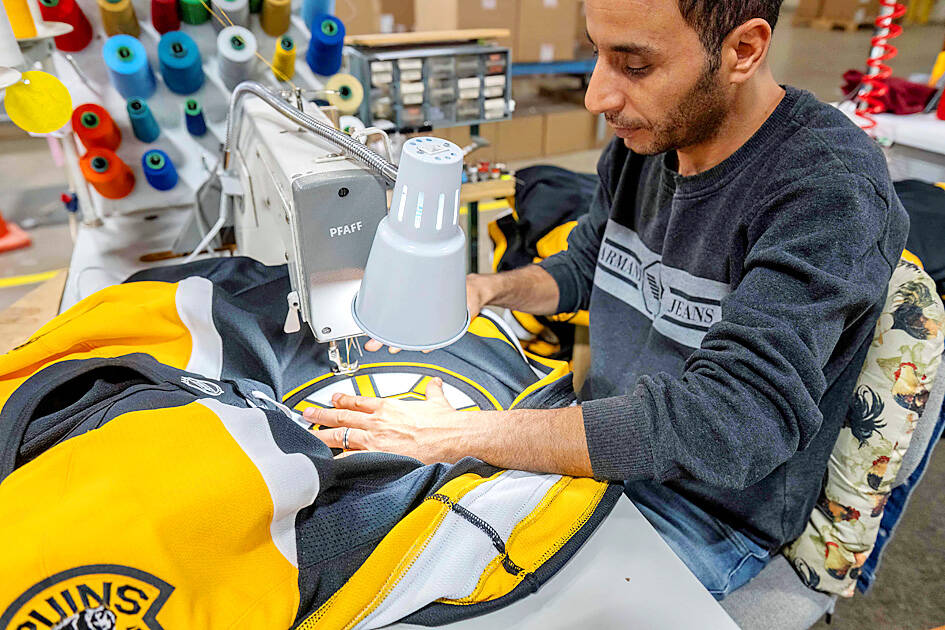As a sport that involves men colliding at high speeds, bare-knuckle brawls, and a fair number of players with missing front teeth, ice hockey is not commonly linked to high fashion.
However, SP Apparel, a Canadian company based east of Montreal that makes the jerseys worn by all 32 NHL teams, says superior material and meticulous craftmanship have kept it at the top of the game.
“It’s like haute couture,” said Steve Berard, president of the company with 260 employees in the city of Saint-Hyacinthe in Quebec.

Photo: AFP
SP Apparel has been making jerseys for the NHL for 50 years, through nearly half the league’s 107-year history.
For the last 25 years, it has also made the uniforms for all national ice hockey teams competing at the Olympics. Being based in a hockey-mad nation, which has consistently produced many of the sport’s top stars, has helped SP Apparel retain its primacy in hockey apparel, Berard said.
However, the quality of the product is paramount, he said.
“These are not jerseys made on a production line,” Berard said. “There are 90 pieces to assemble, with different colors and materials.”
The company says its products are made to withstand particularly brutal wear and tear.
So, while there are a few industrial machines like laser fabric cutters at its 9,000m2 factory, seamstresses with simple sewing machines do the assembly work.
An NHL jersey is worn only five to 20 times on average. That depends partly on the individual player’s amount of ice time, and partly on his style of play in a sport in which fights can involve grabbing or even tearing an opponent’s jersey.
The company estimates that it makes 300,000 to 500,000 units per year, including hockey jerseys and socks, as well as the uniforms it makes for major junior Canadian Hockey League and baseball teams (but not those in the major leagues).
During the past Winter Olympics, SP Apparel sent tailors on site to make any repairs or adjustments required during the Games.
The company also accommodates “special requests for certain players,” notably Pittsburgh Penguins star Sidney Crosby, SP Apparel executive director Tania Berlinguette said.
“We make his socks slightly larger because his calves are a little bigger than average,” Berlinguette said.
Staff said the most popular jersey on the factory floor belongs to the Vegas Golden Knights, with fine detailing that nods to a knight’s mesh armor, and the words “Always Advance. Never Retreat” on the inner collar.
Lyne Gagne, who has worked at SP Apparel for 35 years and now oversees a department responsible for a jersey’s final detailing, said the work has changed considerably over the years.
Jerseys are now “much more adapted to the players’ movements,” she said.
“They used to be straight cut, with big sleeves, with five to 10 pieces. Now they hug the body and the material is different,” she said.
The predominance of SP Apparel’s jerseys at hockey’s highest levels is a “source of pride” for employees, she said.
“When you watch a hockey game, you know that the jersey has passed through our hands,” she added.

Taiwan’s rapidly aging population is fueling a sharp increase in homes occupied solely by elderly people, a trend that is reshaping the nation’s housing market and social fabric, real-estate brokers said yesterday. About 850,000 residences were occupied by elderly people in the first quarter, including 655,000 that housed only one resident, the Ministry of the Interior said. The figures have nearly doubled from a decade earlier, Great Home Realty Co (大家房屋) said, as people aged 65 and older now make up 20.8 percent of the population. “The so-called silver tsunami represents more than just a demographic shift — it could fundamentally redefine the

Businesses across the global semiconductor supply chain are bracing themselves for disruptions from an escalating trade war, after China imposed curbs on rare earth mineral exports and the US responded with additional tariffs and restrictions on software sales to the Asian nation. China’s restrictions, the most targeted move yet to limit supplies of rare earth materials, represent the first major attempt by Beijing to exercise long-arm jurisdiction over foreign companies to target the semiconductor industry, threatening to stall the chips powering the artificial intelligence (AI) boom. They prompted US President Donald Trump on Friday to announce that he would impose an additional

China Airlines Ltd (CAL, 中華航空) said it expects peak season effects in the fourth quarter to continue to boost demand for passenger flights and cargo services, after reporting its second-highest-ever September sales on Monday. The carrier said it posted NT$15.88 billion (US$517 million) in consolidated sales last month, trailing only September last year’s NT$16.01 billion. Last month, CAL generated NT$8.77 billion from its passenger flights and NT$5.37 billion from cargo services, it said. In the first nine months of this year, the carrier posted NT$154.93 billion in cumulative sales, up 2.62 percent from a year earlier, marking the second-highest level for the January-September

Asian e-commerce giant Shein’s (希音) decision to set up shop in a historic Parisian department store has ruffled feathers in the fashion capital. Anger has been boiling since Shein announced last week that it would open its first permanent physical store next month at BHV Marais, an iconic building that has stood across from Paris City Hall since 1856. The move prompted some French brands to announce they would leave BHV Marais, but the department store had already been losing tenants over late payments. Aime cosmetics line cofounder Mathilde Lacombe, whose brand was among those that decided to leave following